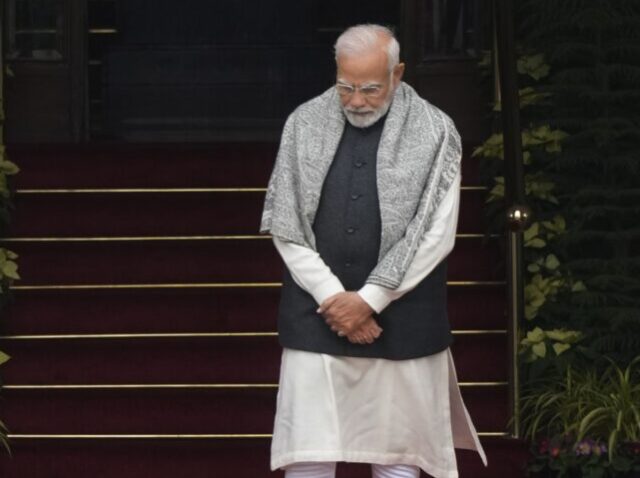The Press Trust of India (PTI) reported Thursday that left-wing American President Joe Biden extended a state visit invitation to Indian Prime Minister Narendra Modi.
The Indian government reportedly accepted, but discussions on the trip are in very preliminary stages and the logistics of such a trip have yet to be confirmed. PTI claimed, citing anonymous sources, that the visit would be for the “summer,” likely in July or August.
Modi, a Hindu nationalist firebrand whose foreign policy has prioritized competition and defense buildup against China, will have completed a decade of serving as prime minister next year. He has never been to America as part of a state visit — a formal event reserved for other heads of government that typically includes a lavish banquet. He has visited the White House as a guest of the president and visited Biden in 2021.
Biden has hosted only one such leader, France’s Emmanuel Macron, for a state visit since taking office in 2021.
Citing unnamed sources without identifying them as either Indian or American, PTI claimed that the invitation “would include the rare honour of an address to the joint session of the US Congress by PM Modi.”
The PTI report follows the news this week of Washington and New Delhi cementing the next steps in a technology and defense partnership known as the U.S.-India initiative on Critical and Emerging Technology (iCET), agreed upon in May but finally taking concrete shape in the form of cooperation on rare-earth mineral development, cybersecurity, and space research, and General Electric (GE) brokering a deal to produce jet engines in India.
The potential state visit also comes as India balances overt attempts to arm its border with China and attract manufacturing business currently established there with its increasingly close relationship with Russia. India has dramatically increased purchases of Russian fossil fuels, made cheap by Ukraine-related sanctions, and of Russian weapons, outraging Washington. In response to discontent from the West, Indian officials have complained that Western powers have not done enough to help India develop a robust military.
“The U.S. really views that this is in our strategic interest to support India’s rise as a global power,” an unnamed Biden administration official told reporters this week, according to multiple Indian news outlets.
Attempts to bring Modi closer into America’s orbit may result in an eruption of criticism of Biden’s foreign policy. Modi’s Hindu nationalist Bharatiya Janata Party (BJP) has resulted in skyrocketing rates of persecution and mob violence against Muslims and Christians but little criticism from Washington under Biden. India is notably absent from the State Department’s list of countries of particular concern regarding religious freedom despite widespread reports of lynching of priests and attacks on known Christian communities by Hindu nationalists, with little government response.
The White House announced concrete advances in the development of iCET on Monday following high-level meetings between National Security Adviser Jake Sullivan and his Indian counterpart Ajit Doval.
“The two sides discussed opportunities for greater cooperation in critical and emerging technologies, co-development and coproduction, and ways to deepen connectivity across our innovation ecosystems,” the White House said in a statement on Monday. The General Electric deal was the most high-profile project under the iCET umbrella announced this week, and one that addresses India’s repeated concerns that the West does not trust its armed forces enough and pushes it to have to make deals with countries such as Russia.
“We have, as you know, a substantial inventory of Soviet and Russian-origin weapons, and that inventory actually grew for a variety of reasons,” Indian External Affairs Minister S. Jaishankar said in October. “You know, the merits of the weapon systems themselves, but also because for multiple decades, Western countries did not supply weapons to India, and in fact saw a military dictatorship next to us as the preferred partner.”
Jaishankar was referring to longstanding defense cooperation between the United States and other Western countries with Pakistan. India has refused to participate in sanctions against Russia over its invasion of Ukraine despite Western pressure.
India proposed a 13-percent increase in defense spending for 2023-24 on Wednesday, bringing the total spending to $72.6 billion. Significant percentages of the proposed budget were allocated to building roads along the difficult Himalayan terrain marking the disputed border between India and China, as well as supplies such as military aircraft that could be used for surveillance on the border.
An Indian border police report leaked to the press last month indicated that New Delhi officials expect “frequent” clashes with China’s People’s Liberation Army (PLA) on their mutual border in the next decade. Chinese and Indian soldiers have increasingly crossed paths, often violently, on the border. The deadliest exchange in recent memory occurred in June 2020, when Indian soldiers found PLA fighters erecting tents and establishing themselves within Indian territory in the Galwan Valley, Ladakh region. Chinese soldiers reportedly attacked the Indians with sticks and rocks when confronted about their illicit presence, triggering a brawl that is believed to have killed about 20 Indian soldiers and 40 Chinese. The Chinese government still claims only four deaths in the Galwan Valley incident at press time, a sum Indian officials have disputed.

COMMENTS
Please let us know if you're having issues with commenting.